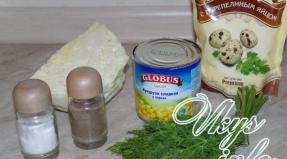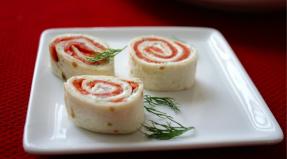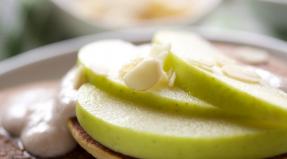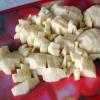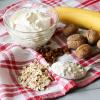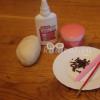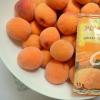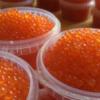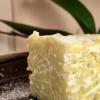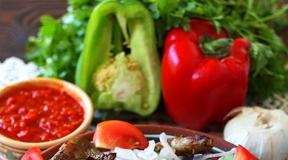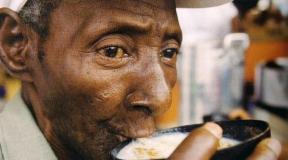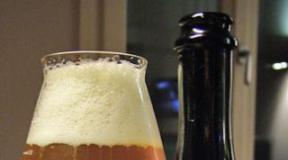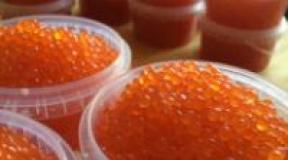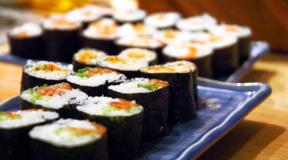Which raisins are the most useful: light or dark, with or without seeds. Why blue and brown raisins are healthier than yellow
Raisins are one of the most beloved and widely presented dried fruits on the shelves of our stores. It is not for nothing that its name has become a household name, meaning something original, hiding inside and creating an image of the object under discussion. Raisins are used in cooking and traditional medicine, as they have a number of beneficial properties.
What types of raisins can be found on the shelves
If you carefully study the proposed raisins, you can see that they all have a different modification, it differs by varieties and countries where the plant grew. The product has seeds or is sold without seeds, depending on the grape variety.
Large imports of berries come to our country from Turkey, Iran, Afghanistan and Uzbekistan. Record holder for growing seedless varieties - California, USA. Grapes make up a third of the world's total harvest! Most of all, this product is popular in the East and the Mediterranean.
Over the past centuries, the grape varieties have hardly undergone any changes, only the trade marks that were engaged in the production and sale of dried grapes changed.
All of them create 4 main types of raisins from 4 main varieties of fruits:
- "Kish-mish" or "Sabza" - berries of a greenish-yellow color and small size without seeds.
- "Brana", "Shagan" or "Korinka" are dark, sometimes burgundy berries without seeds, are characterized by a high glucose content, and seem to be dry outwardly.
- A popular, medium-sized, light olive color with one bone and many names.
- "Ladies' fingers" or "Germany" - large berries with dense pulp, appetizing, have a shade of amber, unusually sweet, have 2-3 seeds.

It is believed that dark raisins have medicinal properties. For bakery products, the first two are used, since they do not have seeds. For cakes and muffins, raisins from "Brahma" are the most delicious choice. The third type is excellent in compotes, drinks, pilaf, meat dishes, it is combined with apricots. The fourth type is widely used by confectioners.
In stores you can find raisins of different manufacturing methods, there are those that are made by hand, and there are factory brands. The first type has an unsurpassed aroma that factory-made raisins cannot convey, but at the same time it is not so well cleaned of all kinds of impurities.
The most popular raisin trade marks presented on modern counters are Maloyar, Sultana, Golden, Shiganov. Sultana is divided into three grades - superior, first and second.
If we talk about the quality of cleaning, then these are three types:
- Euro;
- semifinished;
- industrial.
When communicating with sellers from the southern regions, you can hear the following words: Soyagi, Sabzi, Bedonia, Shiganov, Avloniy, Germian, all of them mean raisins from the Kish-mish grape variety, its different varieties.
The differences are as follows:

- Bedonia has a white tint;
- Sultana is sun-dried without being cleaned;
- Sabzi is dried in the sun using an alkaline solution;
- Soyagi is dried in the shade;
- Shaganov has a very dark shade;
- Avloniy is made from a wide variety of grape types, sun-dried, not peeled;
- Germian uses the best varieties of large berries, sun-dried, scalded in lye.
Why you need to eat raisins
Raisins are widely used, they are loved and therefore popular. At the same time, all the useful components of the berry are preserved in its composition. Nutritionists say that it is 80% vitamins and 100% trace elements. The only drawback of raisins is that they are very high in calories. Grapes contain a lot of sugar - about 90% of glucose in the composition, and the calorie content is 300 kcal. As for the rest of the components, the fat is about 1 g, protein 3 g, carbohydrates up to 70 g. Ash, fiber, nitrogen-containing components can be found in it.

Raisins are a source of acids very important for the human body - tartaric and oleanolic, B vitamins, iron, calcium and magnesium. The list of important substances can be continued for a very long time.
To negate the main disadvantage of raisins - its calorie content, it is enough just to limit the consumption of this product. But with reasonable consumption, you can get a charge of vivacity, energy and vitality. Some people note that raisins relieve puffiness well. To quickly remove swelling, any animal fat is added to the soaked berries and this mixture is applied to the site of the swelling. Dried grapes are recommended for women during pregnancy or menopause, as they are a rich source of calcium. The acids included in its composition are natural antioxidants that improve immunity and the condition of the skin.

The composition contains calcium, which has a positive effect on the work of the heart, if you eat one handful of this tasty and healthy delicacy per day, you can strengthen the nerves and establish a good sleep. In terms of the amount of iron contained, the berries surpass even apples, they are optimal for use in case of anemia. The composition contains boron, it is he who contributes to the better absorption of minerals, therefore raisins are useful for osteoporosis and osteochondrosis.
It will be useful for men to find out that raisins contain iron oxide - a source of energy for the cavernous bodies of the penis, which are responsible for erection, and it also has a general tonic effect for the body.
Raisin Treatment Recipes
To strengthen the heart muscle, you must use the following recipe: rinse 2 kg of berries and take 40 berries in the morning and evening before going to bed, do this every day until the berries run out. After six months, the procedure must be repeated.
To cure a respiratory disease, soak 30 g of raisins for an hour, eat them before bedtime, drink 200 ml of the treat with warm milk. Another recipe: pour 200 ml of boiling water over 100 g of dried berries, leave for 10-15 minutes, then strain and add 2 tablespoons of onion juice to the resulting liquid. Take this infusion 3 times a day and the cold will evaporate very quickly!
Raisins are dried grapes. The very name "raisin" translated from the Turkic language means "grapes". There are several classifications of raisins: by belonging to the variety, by the method of processing, by quality characteristics.

Thus, raisins are usually divided into four types:
Kishmish, or light raisins - rather small, seedless, dried from white grape varieties;
Shigani, or dark raisins - can be black, blue or burgundy, dried from grape varieties "korinka", can be sweet and semi-sweet, dryish;
Common raisins are light olive in color with one stone, medium size;
Ladies fingers - very large, fleshy, sweet with large bones, dried from the germian variety.
The first two types of raisins are often used for the preparation of bakery and confectionery products. That being said, the latter is believed to be particularly suitable for cupcakes. The third type is most often used for preparing compotes and other drinks. It is also well suited for meat dishes and pilaf. Usually in this case it is customary to combine it with apricot. The fourth type is also widely used in cooking.
In the sphere of trade, it is customary to distinguish between factory and manual raisins. Factory is better cleaned of various impurities, but it is not as aromatic as a hand-processed product.
According to the degree of processing and cleaning, raisins are conditionally subdivided into: Eurosort; semifinished; industrial.
There is also a certain gradation within the varieties. For example, raisins can be subdivided into several varieties, such as:
White raisins dried in the sun without pretreatment
Sabza - the same raisins dried in the sun after scalding in an alkaline solution
Soyagi - grapes dried in the shade in special rooms
Shagani - black raisins dried in the sun without processing
Avlon - raisins from grapes with seeds of any varieties, dried in the sun without pretreatment
Hermian is a coarse-grained raisin of the best raisins, obtained by drying in the sun with scalding in alkali.
Raisins contain vitamins B1, B2, B5, which contribute to the normal functioning of the nervous system and good sleep, as well as large amounts of potassium. In addition, raisins also contain elements such as sodium, phosphorus, magnesium, calcium, and iron. It should be noted that the amount of sugars - glucose and fructose - in raisins is 8 times higher than in grapes.
It is believed that darker varieties of raisins are healthier than light varieties.
The healing properties and benefits of raisins were highly valued even among the inhabitants of the Ancient East. So it is believed that raisins are very good for the heart, and strengthens the heart muscle. Some doctors assure that blue raisins help to increase the volume of hemoglobin in the blood and strengthen the immune system.
Scientists have come to the conclusion that dark varieties of raisins can be used as a preventive measure for tooth decay and gum disease. The antioxidants present in raisins, in particular oleanolic acid, inhibit the growth of bacteria that cause dental disease.
The connection of boron with calcium in this product makes it a good prophylactic and therapeutic agent for osteoporosis and osteochondrosis. Due to the presence of potassium, in combination with diuretic properties, raisins are useful for edema and poisoning. Also, this product is recommended in case of loss of strength, fatigue and nervousness. It is believed that the amount of magnesium and vitamin B group makes this dried fruit a good remedy for eliminating insomnia, depression and raising mood. Due to the presence of antioxidants, raisins are considered a good cancer prevention agent. It is believed that raisins are useful for fevers, anemia, kidney and digestive system disorders.
Various sources recommend raisins to people who subject themselves to constant physical activity, since it contains vegetable fats and proteins (proteins). So nutritionists advise athletes to combine raisins with nuts and honey, this composition will also help students during a busy period of sessions. In addition, raisins have a positive effect on memory.
In folk medicine, raisins have long been used for medicinal purposes and are used for colds, coughs, bronchitis, and pain in the heart. Also, some experts recommend raisins during the period of rehabilitation after illnesses.
It is important to remember that raisins are a fairly high-calorie product, since they can contain from 250 to 500 calories per 100 grams of dried berries.
Raisins are included in the composition of both sweet confectionery and bakery products, and are added to the first and second courses. Raisins are added to salads, cereals and soups. Raisins go well with meat, fish and vegetables, as well as dairy products. Very tasty drinks are also prepared from raisins: compotes, fruit drinks, infusions. Crushed and pitted, it is used for making puddings and pastries.

Raisins should be washed very thoroughly before eating, as industrial drying processes them with sulfur and other chemicals that can negatively affect health. If you choose raisins by their appearance, then the raisins obtained from light grapes should be dark, brown during the drying process. If the raisins are oily, uniformly yellow and soft, this is a sign that the berry has been processed and a reason to refuse to buy.
Among the considerable amount of dried fruits presented to the consumer, raisins are the most purchased and affordable. It has long been widely used in cooking and folk medicine due to its unique healing properties.
The many varieties of this sunny dried fruit are due to the wide distribution and wide variety of grapes grown.
The main suppliers of raisins are Iran, Turkey, India, North America (California), Uzbekistan and other Central Asian countries.
In order for the consumer to decide on the choice of which variety of raisins he needs, he needs to know the features of this or that type.
- "Sabza" or "kishmish" are small light berries made from white and green seedless grapes with high sugar content. They are widely used in the bakery and confectionery industry.
- "Korinka" or "shigani" is the healthiest variety of raisins. The berries are smallish, seedless, dark, burgundy-bluish or bluish-black. These berries are perfect for making sweet pastries.
- Ordinary dried grapes of medium parameters, olive-gray color, contain one seed and are best suited for adding to dried fruit compotes and making other drinks.
- Large beautiful dried amber grapes with seeds. This is the most attractive and fleshy type of raisins, which is made from large berries with a rich bright taste (grape varieties "Husayne" or "germiana"). It is massively used in cooking.
Trade varieties
There are different names for raisins in the trade, but the most popular and sold varieties are:
- "Malayar" - a light brownish seedless variety of Iranian origin, distinguished by the even, uniform size of the berries;
- "Sultana" - light or brownish raisins, pitted and made most often in Iran;
- "Golden" - a sugar-free seedless variety of golden color;
- “Shigani” is a dark-colored variety that does not contain seeds.
Based on the quality characteristics, seedless raisins are also divided into three varieties: superior, first, and second.
Separation of raisins by processing level
- Eurosort is a high quality product. It is intended for use in the food industry. Before being sold, raisins undergo multi-stage processing: removal of debris and stalks, cleaning and oiling.
- Raisins "semi-finished product";
- Raisins "industrial".
Varieties by processing method
Raisins, as you know, are most often produced in countries with suitable natural conditions. Locals in these regions, for the most part, are fluent in the technique of drying grapes. Therefore, from the local producers you can hear the names of raisin varieties, depending on the drying methods:
- "sabza" - seedless berries, dried after preliminary treatment with an alkaline solution;
- "golden sabza" is obtained after treatment with an alkaline solution, and then fumigation with sulfur dioxide;
- "bedona" - seedless raisins obtained by the sun drying method without additional processing;
- "soyagi" - raisins obtained by the shadow drying method without processing;
- "shagani" - dark berries, dried under the rays of the sun;
- "avlon" - dried grapes with seeds of different varieties without additional processing;
- "germian" - large berries made after short-term scalding in an alkaline solution and drying in the sun;
- "golden germian" - obtained after treatment with an alkaline solution and fumigation of sulfur dioxide.
Whatever the raisins are, it will always remain a healthy, tasty and nutritious product that is perfectly absorbed by the body and is widely used in various areas of the food industry.
Views: 1988
09.02.2018
Raisins, as everyone knows, is a type of dried fruit and, in fact, is a dried grape. This delicacy has been enjoying well-deserved popularity for over five and a half thousand years, although raisins (from the Turkic dialect this word is translated as "grapes") were previously considered exclusively a berry containing seeds.
The seedless product is popularly called "kishmish".
How are raisins made?
Usually growers, in countries where climatic conditions permit, dry grapes under the sun in the open air for two or more weeks. A prerequisite is the presence of light, air and heat, therefore the largest amount of raisins is produced in Asia and North America.
For the preparation of raisins, not every grape variety is suitable, but only berries with a thin skin and juicy fleshy pulp.

Properly cooked raisins during the drying process in the fresh air, as a rule, do not lose their nutritional and beneficial properties, while retaining up to 80% of vitamins and completely preserving all essential nutrients.
To get one kilogram of ready-made delicacies, winegrowers have to dry up to five kilograms of raw materials.
Alas, recently raisin producers, to reduce labor costs and speed up the drying process, are increasingly using artificial equipment (ovens) for temperature processing of berries, using chemically active substances. Raisins produced in this way, for obvious reasons, are better stored and less damaged by pests and infections. Therefore, if on sale you come across an attractive-looking product of a bright saturated color, then most likely it was artificially dried, treated with sulfur dioxide, and then tinted with a dye. To give the berries shine and an attractive presentation, unscrupulous manufacturers often grease the berries with either glycerin or fat, so you should beware of buying a deliberately low-quality product. Technologically correct dried berries have a natural, natural color and a slight matte bloom.

To check the quality of the raisins, just take and toss the dry berry up. When it falls, it will make a sound that resembles the fall of a small pebble. Any other sound would indicate a fake.
If you nevertheless acquired suspicious-looking berries, you shouldn't worry about this, the sulfurous acid will evaporate during heat treatment, though along with some vitamins and other useful substances. This should be remembered.
Useful properties of raisins
Ancient healers used raisins as a remedy for the treatment of various diseases and until now, grape berries occupy one of the places of honor in folk medicine, continuing to be in high demand due to the presence of a large number of elements useful for the human body.
The energy value of raisins is 300 kcal (in 100 grams of product).

This delicacy contains a huge amount of proteins, fats, carbohydrates, vegetable sugars, acids, tannins and other macro and microelements, including iron, phosphorus, zinc, magnesium, calcium and so on (you can safely list the entire periodic table of the great Mendeleev) ...
It is generally accepted that pitted raisins are healthier than pitted raisins. In addition, according to most scientists, it is thanks to the drying process, in which excess moisture is removed from the berries, that the beneficial substances in the berries become more concentrated. For example, the content of glucose and fructose is eight times the amount of these components, compared to fresh berries.
Raisins contain a lot of iron (especially in dark varieties), a huge amount of vitamins (B1, B2, B5), therefore, the use of berries has a beneficial effect on the human nervous system, improves sleep and has a sedative effect on the body, including strengthening the immune system.

Dried berries help to improve the functioning of the cardiovascular system, activating the activity of the heart muscle, and helping to resist high blood pressure. They should also be used for bronchitis, lung disease, runny nose, cough and sore throat.
Due to the high content of boron in berries, raisins are recommended for the elderly, as they inhibit the development of osteoporosis (improves bone strength). The positive effect of raisins on the kidneys has been proven, since the berries have a strong diuretic and choleretic effect, and also normalize the work of the gastrointestinal tract.
It has long been known that raisins have a softening effect on problems with constipation, and the arginine contained in fruits helps to increase male strength.
Thanks to oleanolic acid, which is part of raisins, a significant antibacterial effect is exerted on the human body, therefore, the use of berries has a beneficial effect on the condition of the dental cavity and gums.

Varieties of raisins
Usually negligent raisin merchants invite buyers, calling just an unimaginable number of different attractive and far-fetched names.
In fact, there are only four varieties of raisins:
Light seedless (raisins)
Dark (black) pitted
One-pit olive
Large raisins with two or three seeds inside

There is also red raisins, which are obtained from grapes with a pinkish tinge. This is a rather exotic type of raisins, which occupies an intermediate position between light and black. This variety comes to the trading network quite rarely.
Consider the types of raisins listed above in more detail:
1. Kishmish, as a rule, is a small variety of grapes (grayish, greenish or white). Depending on the drying method, one or another varietal accessory is determined.
· "Soyaga" - this type of raisins is obtained by drying not in the sun, but in a specially adapted room for this, since grapes dried in the sun, as a rule, are harder.
· "Boyaga" - a variety dried in the open air, under the influence of the sun, without any additional processing.
· "Sabza" - a kind of grape, which is cooked in an alkaline solution before drying in the sun.
White raisins are usually high in natural sugars.

2. Seedless black raisins (sometimes a maroon skin tone) is produced from dark grape varieties. It is often called "korinka". Contains less sugar, but has a pleasant specific musky aroma.
· "Shagani" - a kind of raisins that are dried in the open air, directly under the sun.
· "Avlon". Several varieties of grapes are used for the production of this variety. Drying is done in the sun.
· "Hermian". Like "Sabza", it is preliminarily treated with an alkaline solution before drying. Selected grape varieties are used for the production.
3. Light olive raisins (single-pit) are the most popular and classic.
4. Black raisins with several seeds are usually quite large and very sweet in taste. Its pulp is juicy and fleshy. It is prepared from the world-famous grape variety "Hermiana" or "Husayne", better known as "Ladies fingers" (the length of individual berries can reach two and a half centimeters).
For its amber shade, this raisin is often called "amber".

Using raisins
Due to its excellent taste, raisins are widely used in cooking. It is used as an ingredient for the preparation of pilaf, other cereals, and is also used in meat dishes and salads.
For obvious reasons, raisins are most actively used in the preparation of various culinary products: in the production of baked goods, muffins, cookies, puddings, ice cream, and so on, the range of its application is very wide.
This product has found a place in medicine and dietetics.

Berries are widely used to cleanse the intestines and heal the kidneys, and are recommended for women during pregnancy.
Raisins also help eliminate edema and are useful for children of any age.
Raisins are used quite effectively, despite their high calorie content, in dietetics, since the dietary fiber of berries, swelling, increases in volume, thereby reducing the feeling of hunger. In addition, the berries contain substances that promote the breakdown of fat cells, which is important.

For cosmetic purposes, raisins are often used to prepare various masks and creams. Its natural strength, thanks to the large amount of powerful antioxidants and nutrients, perfectly rejuvenates the skin.
So eat raisins with pleasure and be healthy!
In the cold season, you especially want sunny berries and fruits.
But retail offers us only imported goods at extortionate prices and unknown, and, therefore, dubious production.
Beloved and such native dried fruits will come to the rescue, namely, healthy and tasty raisins.
Dried grapes were first sourced in the East.
The ancient Persians noticed the benefits of raisins due to its ability to preserve all the nutrients of grapes and took these dried fruits on long military campaigns, long caravans and sea voyages.
There are four varieties of raisins:
1.Blue pitted. Sold under the name "shigani";
2. light boneless. Known as "sabza";
3. light "avlon" with one bone;
4. amber "germian" with 2-3 seeds.
The color of this dried berry depends on the grape variety and production technology. It can be dried both in the sun and in the shade, or pre-doused with an alkali solution. As you can see, raisins retain all the beneficial properties of grapes due to minimal technical processing.
Raisins: composition, calorie content, how they are used
The benefits of raisins for the body are due to its composition:
| element | Function in the body | Content in 100g. |
| Potassium | Maintains water balance and fluid exchange, regulates osmotic (cell) pressure and acid-base balance | 749 mg |
| Calcium | Provides tissue hardness, impermeability of the walls of blood vessels, participates in blood clotting, stimulates hormones and glands | 50 mg |
| Phosphorus | Regulates mental and physical activity, catalyzes chemical reactions in the body, synthesizes protein | 101 mg |
| Magnesium | It is necessary for the production of 300 enzymes in the body, is responsible for the transmission of genetic information, nerve signals | 32 mg |
| Sodium | Maintains the balance of intercellular fluids, neutralizes acids, regulates blood pressure, aids digestion | 11 mg |
| Copper | Forms red blood cells, synthesizes hemoglobin and myoglobin, regulates the respiratory and nervous systems, breaks down iron | 0.32 mg |
| Manganese | Responsible for redox processes, ensures the formation of cartilage tissue, supports the pancreas | 0.3 mg |
| Fluorine | Promotes bone health and healing, inhibits the formation of lactic acid | 234 μg |
| Vitamin C | Forms collagen, removes toxins, regulates the elasticity of blood vessels, protects the endocrine glands | 2,3mg |
| Vitamins B1, B2, B5, B6, B9 | Regulate carbohydrate metabolism, form polyunsaturated fats, control nerve impulses, produce gastric juice | 0.5mg |
| Choline | Protects the liver from obesity, produces lecithin, stimulates mental activity | 11.1 mg |
| Vitamin PP | Provides protein metabolism and cellular respiration, regulates the breakdown of fats and carbohydrates, protects mucous membranes | 1.6 mg |
| Vitamin K | Essential for blood clotting, wound healing, liver cell division, prevents blood diseases | 3.5 μg |
| Glucose | Regulates carbohydrate metabolism, ensures the work of muscle and nerve cells, all metabolic processes, heat exchange | 27.75 g |
| Fructose | Nourishes brain cells, regulates blood glycogen, removes sugar from the body, maintains lymph nutrition | 29.68 g |
Raisins, nutritional value:
Caloric content - 299 kcal
Proteins - 3.07 g
Fat - 0.46 g
Carbohydrates - 79.18 g
The beneficial properties of raisins have found their active use. in medicine... It is indicated for diseases of the bladder, the diuretic effect of this product removes excess fluid from the body, relieves swelling, and normalizes kidney function. Potassium is useful for cardiovascular problems, nervous disorders.
Organic raisin acids have antibacterial properties. It is useful for dysentery, food poisoning, oral diseases. The same antibacterial effect helps with pulmonary diseases (bronchitis, laryngitis, pneumonia), runny nose.
A decoction of raisins reduces high blood pressure, normalizes the functioning of the gastrointestinal tract. The choleretic property of this product relieves belching, heartburn, nausea, and stool problems.
Even dermatological problems can be cured with raisins, for example, lichens, boils. To do this, a gruel from crushed dried berries is applied to the affected area.
Raisins help to normalize the menstrual cycle, get rid of heavy bleeding during menstruation (girls, have adopted).
In cosmetology the benefits of raisins are applied in various hair and face masks. This product cleanses the sebaceous glands, removes oily hair and the skin from oily sheen.
In cooking dried grapes are used as a filling for baking, compotes and fruit drinks are prepared from it, added to baby cereals, pilaf. Meat is stuffed with raisins, dressings and sauces are made, added to vegetable, fruit and meat salads to give a delicate, sweetish taste.
Raisins: what are the benefits for the body?
Raisins are the healthiest of all dried fruits, as they are able to store 70% of vitamins and 93% of microelements of grapes.
Organic raisin acids (folic, ascorbic, nicotinic, tartaric) regulate nervous activity and have a sedative. Therefore, it is useful to eat these fruits in case of stress, overwork, irritability or great mental stress. They also kill harmful bacteria in the mouth (which cause tooth decay and bleeding of the gums).
B vitamins in dried grapes normalize metabolism, improve sleep, reduce appetite, protect against free radicals (toxins), and increase immunity.
Raisins, thanks to iron and copper, help to increase hemoglobin in the blood, prevent anemia and vegetative-vascular dystonia.
Dietary fiber and raisin proteins normalize intestinal function, accelerate fluid metabolism, and eliminate edema.
Regular consumption of raisins (the norm is 60 grams per day) helps to improve the condition of hair, nails, skin, as this product stimulates the kidneys and heart. It also cleanses the liver and spleen, which is the prevention of hepatitis and cirrhosis.
Oleanolic acid of raisins is an antioxidant - it fights age-related changes, resists dangerous viruses and bacteria.
There is no sucrose in raisins (but there is fructose and glucose). This fact allows you to use these berries with excess weight, when you want something sweet, without fear for your figure. Moreover, fructose and sucrose activate energy metabolism and displace harmful sucrose from the body.
Raisins: what is the harm to health?
The harm of raisins is too loud a statement, but there are a number of precautions and contraindications when using these dried fruits:
Raisins are a high-calorie product. Excessive use of it will affect the roundness of the hips and sides.
Accordingly, raisins are contraindicated in diabetes and obesity.
Ulcerative problems and bowel diseases can be exacerbated by eating raisins.
With lesions of the oral cavity (caries, stomatitis), raisins are contraindicated.
Raisins will be harmful and even dangerous for the body if they are not rinsed or doused with boiling water first (you can understand why).
Active stage of tuberculosis or acute heart failure exclude the use of this product.
Individual intolerance and food allergies (where without them).
For pregnant and lactating mothers: the harm and benefits of raisins
The use of dried grapes is shown from the first trimester of pregnancy... The beneficial properties of raisins will help the expectant mother to make up for the vitamin deficiency.
Pregnant women often complain of stool problems. Raisins (or a decoction from it) will solve this delicate problem.
The antibacterial property of these dried fruits will protect the expectant mother from fungi (thrush, stomatitis), increase immunity, and protect against colds.
Organic acids in raisins contribute to the formation of the baby's respiratory, nervous and circulatory systems.
Potassium and iron of dried grapes will raise the hemoglobin of a pregnant woman (by the way, due to low hemoglobin, doctors prescribe a cesarean section) and protect the fetus from oxygen starvation (which is the main cause of mental disability).
Raisin minerals help in the formation of bone and cartilage tissues of the child, and protect the mother from brittle bones, crumbling teeth and hair loss.
A decoction of raisins during pregnancy reduces the risk of rhesus conflict and the appearance of jaundice in a newborn, relieves swelling in the expectant mother, and promotes urination.
The harm of raisins during pregnancy can be due to individual intolerance, as well as contraindications (diabetes mellitus, tuberculosis, stomach ulcer, enterocolitis).
When breastfeeding raisins are also good for the body of both mom and baby:
This product is hypoallergenic (with the exception of individual intolerance), which means that all the beneficial properties will enter the body of the mother and child and will not cause a negative reaction;
Useful fructose and glucose will restore the strength of the mother, and the milk will be made sweet, tasty and abundant;
A decoction of raisins will relieve mom of stool problems, and a small tummy - from bloating and frustration. This drink can be given to a baby one month after birth to improve digestion and relieve colic;
These dried fruits increase the production of red blood cells in the child, restore the mother's hemoglobin.
Raisins for children: good or bad
A decoction of raisins without sugar is recommended for children from the first months of life. It is rich in pectin, potassium, iron, phosphorus, which helps the child develop immunity, promotes the formation of beneficial enzymes in the baby's intestines, soothes nervous irritability and hyperactivity, increases concentration and activates mental activity.
For children after a year and older, these dried berries will not only be useful - they will act as a healthy alternative to sugar and sweets. Important: you cannot give your child dry raisins - the baby has not yet learned to chew. the berries are pre-poured with hot water, allowed to swell. Pediatricians recommend giving this product from the age of one and a half, when the child's teeth come out.
Read also ...
- Chicken liver pate
- Delicious zucchini with cheese in sour cream in the oven - a step by step recipe with video Zucchini recipes in the oven with sour cream
- Banana rice and corn flour pancakes (gluten free) with homemade banana sauce Banana pancakes with semolina
- Cabbage casserole with chicken Chicken fillet casserole with cabbage
